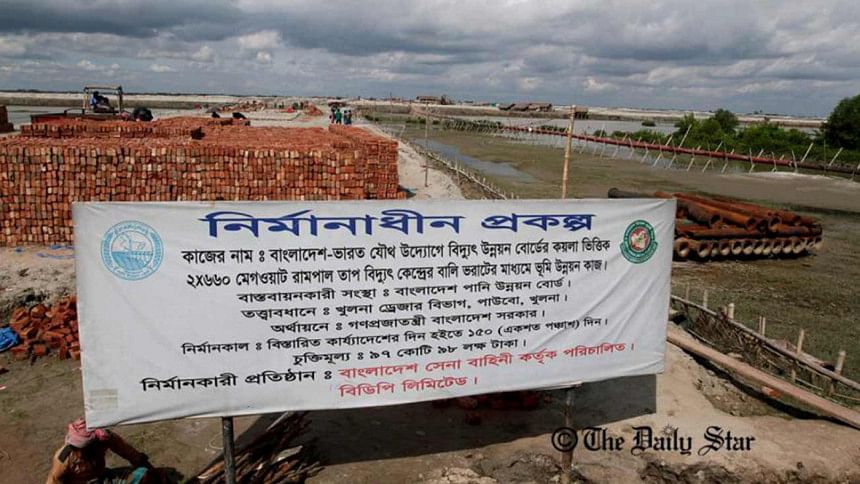Opinion: Real Crocodile tears in the Sundarbans

Within days of three French banks deciding not to invest in the Rampal 1320 megawatt coal power plant next to the Sundarbans, Prime Minister Sheikh Hasina Monday criticised those who opposed the power plant.
She said: Bangladesh is ours -- I don't believe others will show more kindness than me in saving the country as well as the Sundarbans. They are shedding crocodile tears.
She also said that the government would not have gone for the plant, if it would have harmed the Sundarbans. She has said this before.
The prime minister mentioned the existing Barapukuria coal power plant in Dinajpur and asked Opposition leader Raushan Ershad, a critic of the Rampal plant, "Let me ask you…, what are the adverse effects of that power plant in that area. Can anybody point out any sign of negative effect? No."
That there is adverse impact of the Barapukuria coal power project along with the Barapukuria coal mine, is a fact. The Daily Star had reported in the past that due to the huge amount of water usage by the power plant and the mine, the ground water level has dropped significantly—forcing the villagers around the mining area either to use very deep tube wells or get water from faraway places. In fact there is now an NGO working there just to help people with water.
Therefore the prime minister's claim does not match reality.
Similarly, we don't feel so confident about the prime minister's assurance that the government would not have gone for a project harmful to the Sundarbans because we have seen how the government handled a mere oil tanker accident in the Sundarbans December last year.
When the oil tanker Southern Star VII sank in the Shela river with three lakh litres of furnace oil after a collision, no expert team was sent to handle the disaster. It was left to the forest department to handle a situation it was not meant to handle. The result, around 2.25 lakh litres of this oil had spread into the forest's eco system and we don't know what would be the long-term impact there.
When three French banks have decided not to invest in the Rampal project, the prime minister should ask herself—are these banks our opponents? Do they have any political reason not to fund a Bangladeshi project? Do they have other reasons like doubting the environment impact assessment (eia) report of the project done by a Bangladeshi agency Cegis?
Forget the French. There are other banks who have done the same. Last year two Norwegian pension funds pulled out their investments from India's National Thermal Power Corporation (NTPC) that is jointly building the project with Bangladesh Power Development Board (BPDB) by forming a company.
Too many déjà vu?
The government had initially targeted to kickstart the project from 2013. Then due to various reasons, the authorities repeatedly changed schedule and finally set December as the deadline to award contract to build the plant. Till date this has not been done. Why? The government is still saying that they are "fine tuning" the bid documents.
But our sources say the project could not go to the next stage as the authorities could not secure finances. The financiers are not interested in this project as they did not want to be blamed for destroying the world heritage forest.
While the government tend to look at harmful impact of the plant in terms of emission, the actual risk of running the plant in Rampal comes from supply of coal, dumping the waste and disturbingly frequent movement of heavy coal carrying vessels through the Sundarbans. The frequent movement of vessels will affect the shoreline and the forest directly through erosion.
The government can control emission, but it won't be able to control the above factors and stop accidents from happening. And when there is an accident, it would not be able to handle it as we have seen in the recent past.
The prime minister must also remember that there is just one Sundarbans in the world—not just in Bangladesh. Why take this risk when we can have this power plant somewhere else? Nobody is criticising the government's plan to build plants in Maheshkhali—why not take it there?
Crocodile tears? Yes. The Sundarbans' crocodiles will be crying for real for their survival as the project rolls on. The prime minister would not know—because crocodiles and the forest do not have voices.

 For all latest news, follow The Daily Star's Google News channel.
For all latest news, follow The Daily Star's Google News channel. 



Comments